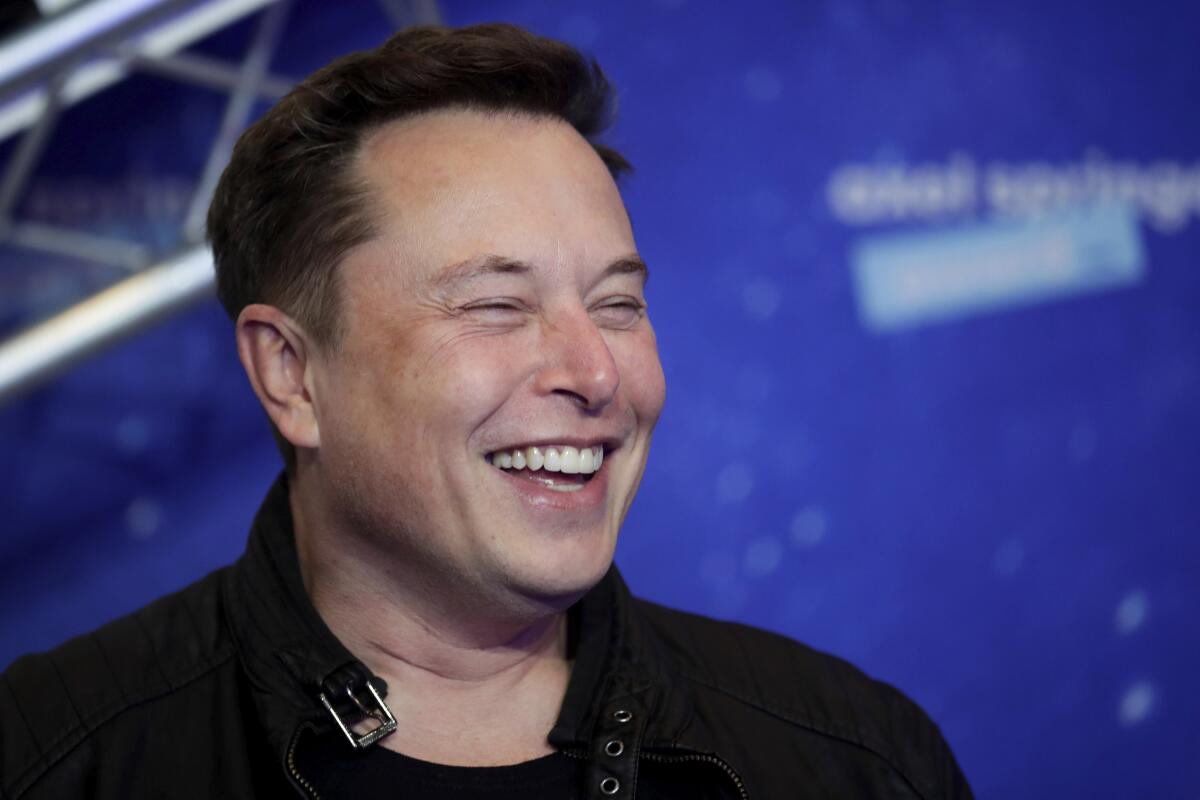Elon Musk keeps sparring with regulators as Biden era begins

- Share via
Elon Musk has a long history of run-ins with the local, state and federal officials who oversee his growing empires at Tesla Inc. and SpaceX. The world’s richest person shows no signs of changing his ways as President Biden bolsters the regulatory agencies defanged by his predecessor.
In the last week alone, Musk has tangled with the Federal Aviation Administration over a December rocket test flight that ended in flames and begrudgingly agreed to recall some Tesla cars at highway-safety officials’ urging. And although he announced Tuesday that he was taking a break from Twitter — the platform where his behavior previously got him fined by the Securities and Exchange Commission — Musk had already used his favorite social-media megaphone in the preceding days to roil stocks of companies including Etsy Inc. and Shopify Inc. during a retail-trading frenzy.
The potential for more conflict is building as Biden works to confirm his cabinet secretaries and reinvigorate agencies following the Trump era. Democratic administrations have historically been tougher on industry regulation, and Musk’s empire intersects with government oversight of automobiles, spaceflight, energy, telecommunications and medical equipment.
On Tuesday, the FAA said that Musk’s Space Exploration Technologies Corp., known as SpaceX, had ignored the agency Dec. 9 when it went ahead with a test launch of its massive Starship rocket — a test that ended in a blazing fireball when the prototype malfunctioned on landing. The FAA said it had rejected SpaceX’s request to exceed the maximum public risk for that launch.
The FAA’s comments added some clarity to the dispute that triggered an angry tweet from Musk on Jan. 28 in which he accused the agency of having a “fundamentally broken regulatory structure.” Musk unleashed that ire against the FAA after another SpaceX test flight was delayed.
Without giving much detail, the FAA said in a Tuesday email that SpaceX was now in compliance and could proceed with another test. Within hours, the Starship SN-9, with no crew aboard, lifted off from SpaceX’s seaside launch pad in Boca Chica, Texas, flew to an altitude of about 6 miles — and exploded as it attempted to land, much like the December test flight.
Meanwhile, Tesla has been engaged in a long back and forth with the National Highway Traffic Safety Administration over the failure of touch screens in some of its Model S and Model X vehicles. Last month, NHTSA sent a letter to Tesla saying the agency had determined the failures constituted a defect. Tesla responded that it “respectfully disagrees” with the finding but would voluntarily initiate a recall. Affected Tesla customers received emails that said they would be notified “when the parts become available.”
“Tesla makes it very clear that they don’t think this is necessary but they are doing this to make the issue go away,” Frank Borris, a former head of the agency’s Office of Defects Investigation who now runs a safety consulting business, said Tuesday. “If NHTSA had not written the recall request letter, Tesla would not have done this.”
Musk, 49, is widely heralded for disrupting the auto industry with high-performance electric cars and upending Big Aerospace with reusable rockets.
His companies are growing: Tesla is building new factories in Berlin and in Austin, Texas, while SpaceX — which has contracts with the Air Force and NASA — is rolling out Starlink, its high-speed internet service, to rural and remote customers across the U.S., Canada and the U.K. There’s also Boring Co., his tunnel-construction business, and Neuralink, which is testing its brain machine interface device on monkeys and pigs and hopes to begin human trials this year.
Musk’s frustration with regulators is legendary.
He once hung up during a testy call with the head of the National Transportation Safety Board over Tesla’s Autopilot driver-assistance system; the NTSB had been irked in part by the company’s public comments about a crash investigation. Tesla has aggressively pushed out Autopilot — including what it calls a Full Self-Driving upgrade — much to the consternation of some safety advocates, even as driverless tech rivals such as Google parent Alphabet Inc.’s Waymo unit in recent weeks have taken pains to be more transparent and circumspect with their claims.
When public health officials in California’s Alameda County ordered Tesla to close its factory last spring as the COVID-19 pandemic took hold in the U.S., Musk railed against the shutdown orders — calling them “fascist” — on the company’s earnings call, and he reopened the factory without county permission. And despite settling with the SEC over his failed go-private bid in 2018, Musk has continued to taunt the agency, referring to it as the “Shortseller Enrichment Commission.”
The 2018 settlement stripped Musk of the chairmanship of Tesla’s board for three years, meaning he could potentially resume the role this fall — just as the Biden administration is re-establishing the government’s role in oversight.
More to Read
Inside the business of entertainment
The Wide Shot brings you news, analysis and insights on everything from streaming wars to production — and what it all means for the future.
You may occasionally receive promotional content from the Los Angeles Times.










